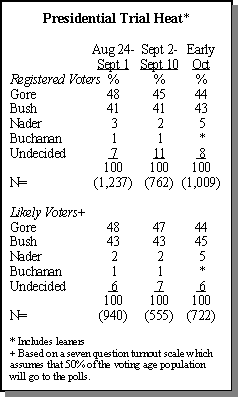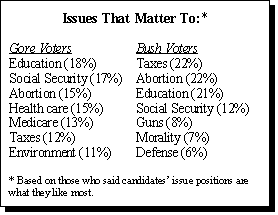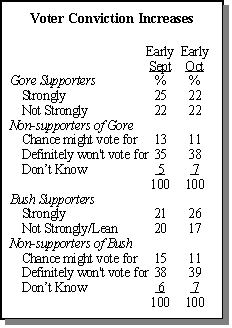Introduction and Summary
 Al Gore’s personality may be costing him votes. Although a plurality of voters believe he won the first presidential debate, he has lost his small September lead over George W. Bush. As the race has narrowed, an increasing number of voters who oppose the vice president say they dislike his personality. On the other hand, Bush has a slight edge over Gore on likabilty and honesty, but a larger percentage now think he is less qualified for the presidency than his rival.
Al Gore’s personality may be costing him votes. Although a plurality of voters believe he won the first presidential debate, he has lost his small September lead over George W. Bush. As the race has narrowed, an increasing number of voters who oppose the vice president say they dislike his personality. On the other hand, Bush has a slight edge over Gore on likabilty and honesty, but a larger percentage now think he is less qualified for the presidency than his rival.
Little wonder that voting intentions are more closely divided than they were in early September, when Al Gore led in a Pew Research Center survey and most other large national polls. Registered voters favor Gore 44%-43% in the current poll, which was conducted Oct. 4-8 among 1,009 respondents. When Pew’s sample is narrowed to those most likely to vote, Bush holds a 45%-44% edge. Neither lead is statistically significant.
Enthusiasm for the vice president has ebbed among his core supporters. Just 48% of Democrats now say they are strong backers of his candidacy, while 63% of Republicans back Bush strongly. Gore has lost ground among men, who have consistently been more critical of him in personal terms than women. Bush made gains among affluent voters, and among mothers of children under 18 years of age.
Swing groups — including independents, middle-income voters, suburbanites, white Catholics, and mainline Protestants — continue to be closely divided on their choice. However, the overall size of the swing vote has declined. In the current poll, 20% said they might switch their preferences by Election Day, compared to 25% in September.
While personal judgments about the candidates are mixed, Gore continues to have the confidence of the electorate on leading issues. He has double-digit leads over his rival on health care, making prescription drugs affordable for seniors and handling the economy. Bush has made some progress in gaining voters’ confidence on abortion and gun control. But he is only able to muster ties with Gore on the two issues that he has emphasized most on the campaign trail: taxes and education.
Issues Boost, Personalities Drag
 Candidate support continues to be driven in large part by perceptions of the candidates’ issue positions. Fully half of those supporting Gore say his position on the issues is what they like most about him. Even more Bush supporters (58%) say the governor’s issue stands are what they like most. Nonetheless, many Gore voters (23%) also point to the vice president’s experience as the main reason they support him, while almost as many Bush backers (20%) are attracted to his leadership ability.
Candidate support continues to be driven in large part by perceptions of the candidates’ issue positions. Fully half of those supporting Gore say his position on the issues is what they like most about him. Even more Bush supporters (58%) say the governor’s issue stands are what they like most. Nonetheless, many Gore voters (23%) also point to the vice president’s experience as the main reason they support him, while almost as many Bush backers (20%) are attracted to his leadership ability.
Personality is more a liability than a plus for both candidates in this campaign. Fully 26% of Bush voters say what they like least about Gore is his personality. This is up sharply from 17% last month. A similar proportion of Gore supporters (25%) say what they like least about Bush is his personality, up modestly from 20% last month. Still, issues dominate here as well. A plurality of Bush voters (44%) point to Gore’s issue positions when asked what they like least about him. Similarly, 37% of Gore voters say Bush’s issue positions really turn them off.
 When these issue-driven voters were asked what specific issue positions they liked, two distinct sets of issues emerged. Gore’s issue voters named education, Social Security, abortion, health care and Medicare most often. Bush’s supporters cited taxes, abortion, education, Social Security and guns.
When these issue-driven voters were asked what specific issue positions they liked, two distinct sets of issues emerged. Gore’s issue voters named education, Social Security, abortion, health care and Medicare most often. Bush’s supporters cited taxes, abortion, education, Social Security and guns.
A Smaller Swing Vote
There is somewhat less indecision among voters now compared to last month. Only 20% now say they might change their mind and vote for a candidate they’re not currently supporting, down from 25% in September.
Bush now enjoys slightly stronger support than does Gore. Twenty-six percent of voters strongly back Bush, up from 21% in September. Gore enjoys strong support from 22% of voters, down marginally from 25% in September. Among partisans, the enthusiasm gap is much more striking. Fully 63% of GOP voters express strong support for Bush. This compares with only 48% of Democratic voters who characterize their support for Gore as strong.
 Among Bush’s strongest supporters are white men, affluent voters, southerners, and white evangelical Christians. Gore’s strongest support comes from blacks, young women, low income voters and labor union members.
Among Bush’s strongest supporters are white men, affluent voters, southerners, and white evangelical Christians. Gore’s strongest support comes from blacks, young women, low income voters and labor union members.
Gaps Galore
The gender gap continues to be a key campaign prism. Gore now leads Bush among women by a margin of 49%-40%, and Bush has opened up his lead among men (46%-39%). Men under 50 support Bush over Gore by a comfortable margin (49%-36%), while older men continue to narrowly favor Gore. Women under age 50 remain more closely divided than their older counterparts. They prefer Gore over Bush 49%-41%, while older women favor the vice president by a 51%-38% margin.
Since last month, affluent voters have also moved sharply toward Bush. Those with family incomes in excess of $75,000 gave Bush only a slight edge over Gore last month (47% vs. 44%). Now this group prefers Bush over Gore by a solid 54%-33% margin. In addition, Bush has made some progress in recent weeks in the crucial Midwest region. Midwesterners, who narrowly preferred the vice president a month ago (47%-42%), now choose the Texas governor 48%-39%.
 The gap between parents and non-parents had widened over the past month. Parents now favor Bush over Gore by a margin of 49%-39%. Bush has increased his lead among fathers (who now prefer him over Gore 51%-35%), and he holds a narrow lead among mothers — a key swing group — who favored Gore last month.
The gap between parents and non-parents had widened over the past month. Parents now favor Bush over Gore by a margin of 49%-39%. Bush has increased his lead among fathers (who now prefer him over Gore 51%-35%), and he holds a narrow lead among mothers — a key swing group — who favored Gore last month.
Independents continue to divide evenly between Gore and Bush (37%-36%), and they don’t express a strong preference for either candidate. Much of Ralph Nader’s increased support observed in the past month has come from independents, 12% of whom now say if the election were held today, they’d vote for the Green Party candidate.


